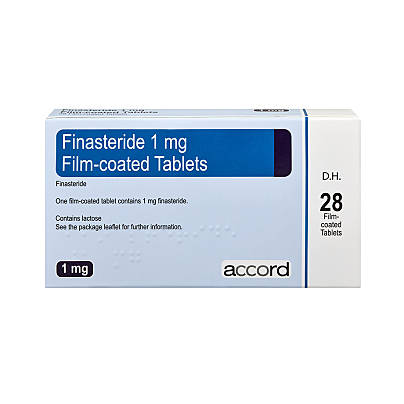How to reduce the side effects of Finasteride

Medically reviewed by
Dr Kathryn BasfordLast reviewed: 09 Mar 2022
Finasteride is a medication you can take to treat male hair loss, also known as male pattern baldness or androgenetic alopecia. You may experience side effects when you take finasteride but these are usually uncommon.
Hair loss in men occurs when testosterone is converted into dihydrotestosterone (DHT). Too much DHT causes your hair follicles to shrink and your hair to fall out, which leads to male pattern hair loss.
Finasteride works by stopping the conversion of testosterone to DHT. This reverses the hair loss process and promotes hair growth. Finasteride is part of a group of medicines called 5-alpha reductase inhibitors. This means they stop the enzyme that converts testosterone to DHT.
Finasteride 1mg tablets are also known by the brand name Propecia. However, these tablets are different from 5mg Finasteride tablets which help treat benign prostatic hyperplasia (BPH).
from £25.00
from £47.00

No results found.
Please check your spelling or try another treatment name.
What are the side effects of finasteride?
Finasteride 1mg tablets have very few potential side effects. The side effects that you may experience from finasteride are uncommon. Uncommon side effects mean out of 1,000 men, they’ll affect less than 10 men.
The uncommon side effects of finasteride include:
- erectile dysfunction
- problems with ejaculation
- depression (feeling extremely sad)
- reduced sex drive
If you experience low moods or depression, stop taking finasteride and speak to your doctor.
Remember that erectile dysfunction can happen even if you do not take finasteride and is easily treatable.
Long term side effects of finasteride
There is some evidence to suggest that finasteride can have long term side effects. These include a decrease in sex drive and erectile dysfunction.
Studies show that a very small number of men experienced these long term side effects when taking finasteride over a 5 year period. The studies also observed that these long term side effects did disappear whether the men continued to take finasteride or not.
Finasteride is also used to treat benign prostatic hyperplasia (BPH). The dose of finasteride to treat BPH is 5mg daily which is taken on a long term basis. Doctors have been prescribing finasteride to treat BPH for a long time. This means there is enough evidence to show that the use of finasteride is safe in the long term.
If you experience any serious side effects, contact your emergency department immediately. This includes having an allergic reaction or pain in your testicles. If these conditions are left untreated they can cause long term effects on your health.
Finasteride tablets should not be used by or handled by women who could be or who are pregnant. Finasteride can cause problems in pregnant women as the active ingredient can harm the developing baby.
Non sexual side effects of finasteride
The non sexual side effects of finasteride can be related to mood changes, such as depression or anxiety.
If you’ve never suffered from depression and find yourself feeling low or very sad after taking finasteride, speak to your doctor. Some studies have shown that there may be a link between finasteride and depression. If you have a history of depression or low moods, speak to your doctor before taking finasteride. They may recommend a different hair loss treatment for you.
As finasteride is a medication that affects your hormone levels, you may feel changes in your breasts. If you notice any nipple discharge, breast tenderness or swelling, speak to your doctor immediately. This could be a sign of breast cancer.
Remember that very few men will experience these side effects as they are extremely uncommon.
Is finasteride safe?
Finasteride is a safe and effective medication to treat hair loss. While many medications have side effects, finasteride has a relatively safe side effect profile. This means that while the side effects may seem serious, you are very unlikely to experience them. You can read the patient information leaflet for more information.
To reduce the side effects of finasteride, make sure you take your tablets as your doctor has directed you to do. You should also see your doctor regularly to check your general overall health while you are taking finasteride.
Finasteride is generally safe to take with other medications. You should always let your doctor or pharmacist know if you’re taking any other prescribed medicines when using finasteride.
There are also alternatives to finasteride, such as minoxidil. You might consider a hair transplant if your symptoms are severe or if other hair loss treatments are not working for you.

Dr Kathryn Basford is a qualified GP who works as a GP in London, as well as with ZAVA. She graduated from the University of Manchester and completed her GP training through Whipps Cross Hospital in London.
Meet our doctorsLast reviewed: 09 Mar 2022
-
Finasteride 1 mg film-coated tablets, Patient Information Leaflet, EMC [accessed January 2022]
-
Hair loss, NHS [accessed January 2022]
-
Finasteride and sexual side effects [April 2012] [accessed Jan 2022]
-
Investigation of Suicidality and Psychological Adverse Events in Patients Treated With Finasteride [Nov 2020] [accessed Jan 2022]
-
Finasteride, NICE/BNF [accessed January 2022]




(Reviews are for ZAVA UK)


GMC: 7074021

GMC: 6149061

GMC: 7085115









